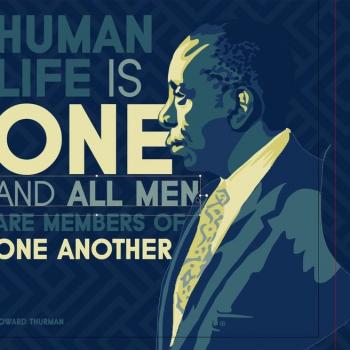The Adventurous Lectionary – The Seventeenth Sunday after Pentecost – September 19, 2021
Proverbs 31:1-10
Psalm 1
James 3:13-4:3, 7-8a
Mark 9:30-37
Today’s scriptures are relational in nature and invite us to ponder the dual threads of relatedness, that is, relationship with others and relationship with God. We must examine our relationships to discern whether they are just and life-supporting, whether they add to or detract from the full humanity and wellbeing of others, and whether we are free (as much as possible) from power relationships based on race, ethnicity, class, economics, and sexual identity. Biblical ethics and spirituality are holistic in spirit and action, and we cannot separate self, other, and God not to mention spirituality and politics. Our own alignment with each of these areas – including the non-human world, economics, and justice – shapes all the others. This week’s scriptures exemplify what it means to be attuned to God’s vision for your life, including our family and church lives. Living by
God’s vision involves openness to life in all its variety and involves affirming many norms for human fidelity and spirituality.
In the twenty-first century, with our diverse and fluid relationships, the passage from Proverbs requires a good deal of updating to speak gracefully to the whole congregation.(One wonders why it was included in the lectionary readings given it pertains only to married women, and to some in a patronizing, if not sexist, manner.) If I were to preach this passage, my approach will be egalitarian in nature, and if you read it, you need to address it! As someone who has been married for over 40 years to a competent, capable, wise, and loving woman, I realize that there is no norm for a healthy marriage or a healthy marital/relational partner nor is marriage the norm for all humans. Faithful relationships and marriages take many forms.
Today we can no longer privilege cisgender heterosexual marriages. Love takes many forms as evident from our positive awareness of the gender-relational spectrum, and so does fidelity, and the traditional hermetically sealed, nuclear marriage may not be life-affirming in a global age, nor does it always promote optimal freedom and creativity. I assume a holy marriage is built on love, trust, and affirmation. It is also built on prayer, freedom, and creativity, and looks outward toward God’s mission. It must now have a political and ecological dimension. But these relational virtues can be expressed in a variety of ways.
Proverbs certainly sets a high bar for wives and, dare we say, husbands. She (or he) is a home manager, gourmet cook, artisan, business person, and moral example to the community. Liberated from sexism – or double standards – this passage should be read as aspirational for all persons in our parenting, domestic life, community service, and professions. A life of integrity is one where all the pieces fit, but not in a specific way. A life of integrity may even defy social norms, inviting role reversals in contrast to our current social conventions, and doing what is best for the greater good, even if we bend gender roles. At the end of the day, Proverbs is about living your life with integrity, attending to God’s vision and embodying it in ordinary acts done lovingly, not in any particular gender role.
Psalm 1 does not provide a norm for goodness or happiness either. I believe attunement with divine law is also multifaceted and not uniform in nature. Still, in a dynamic, interdependent universe, delight in God’s law is not so much a matter of narrow morality or “do’s and don’ts” but a sense of God’s presence throughout the day. I believe it involves attentiveness to divine wisdom in the movement of galaxies, the rotation of the earth, the health of ecosphere, and the securing of wholeness for all people. There is, the Psalmist believes, both wisdom and providence at work in our lives and in the world and when we lean toward the moral arc of history or this particular moment, our lives will flourish, even if we must sacrifice. Attunement with divine law involves practicing the presence of God – meditating on God’s law – in diverse situations and doing something beautiful for God in our personal and corporate relationships. It involves a life of intentionality and mindfulness, setting a vision for your life and embodying it flexibly in everyday life and relationships.
For the Epistle of James, wisdom involves gentleness of spirit and care for the well-being of others. It is born of kindness to friend and foe alike. Gentleness is grounded for reverence for life in its many forms that is exhibited in large-spirited and impartial behaviors. Drawing near to God, presumably through prayer and meditation, awakens us to God’s vision for our lives as a whole and in moment by moment decisions. We can choose to live mindfully and with self-awareness. Mindful living is cultivated by periodic pauses throughout the day to assess our relationship with God and our overall sense of well-being. It is also cultivated by the daily practice of the “examen,” pausing before retiring to review the day, recalling moments of nearness and distance from God’s vision, praying for forgiveness and illumination, and asking for wisdom during the night – through dreams – and in the day ahead.
What might it mean to “resist the devil?” How might we preach such a passage in congregations for whom the devil is a non-entity? Would we couch this in terms of temptation to follow lesser goods, idolatry in terms of professional life and consumption, political incivility? Figuring out our “devils” is a worthy theological and spiritual task.
Today, our “examen” must be global as well as personal. We must address the macro as well as the micro. We can tout the great economy, but as we affirm economic growth we must ask – do economic gains embrace the poor and vulnerable? Are children better off? Is there greater parity among the rich and poor? Does our economy base itself on earth-care for generations to come? Our commitment to civility must include the environment as well as the church, social media, and the family. This is not an argument for homogeneity, but for a larger vision that may, in the end, be more transformative than polarization and shaming.
Mark’s Gospel invites us to consider the meaning of greatness in terms of relational rather than unilateral power. The greatest among us are those who are committed to service and honoring the least of these. Greatness involves welcoming the children in our midst and giving hospitality to the nuisances and nobodies. (John Dominic Crossan) Just as the greatest of virtues is love, the greatest of people are those who love well, seeking beauty and bringing forth wholeness in their relationships.
Love is, as Alfred North Whitehead asserts, oblivious to morals. By that, I believe Whitehead means, that love is often countercultural. Love does not conform to patriarchy or matriarchy, power relationships, possessiveness, or even cultural roles or class-distinctions, but seeks healing and wholeness, freedom and creativity, beauty and growth, for the beloved, whether a child or adult, spouse or friend. Love even may involve sacrifice and suffering to achieve the greatest good and promote beauty of experience. Love is not about “me,” but about “us,” including the non-human world, and may transcend social convention, as Jesus’ love did, to be in congruence with God’s realm. Love and wisdom, as seen in all these passages, points us away from self-interest to care for others and world loyalty.
+++
Bruce Epperly is a pastor, professor, and author of over sixty books, including PROCESS THEOLOGY AND POLITICS; MYSTICS IN ACTION: TWELVE SAINTS FOR TODAY; WALKING WITH FRANCIS OF ASSISI: FROM PRIVILEGE TO ACTIVISM; PROPHETIC HEALING: HOWARD THURMAN’S VISION OF PROPHETIC ACTIVISM; and GOD ONLINE: A MYSTIC’S GUIDE TO THE INTERNET.












